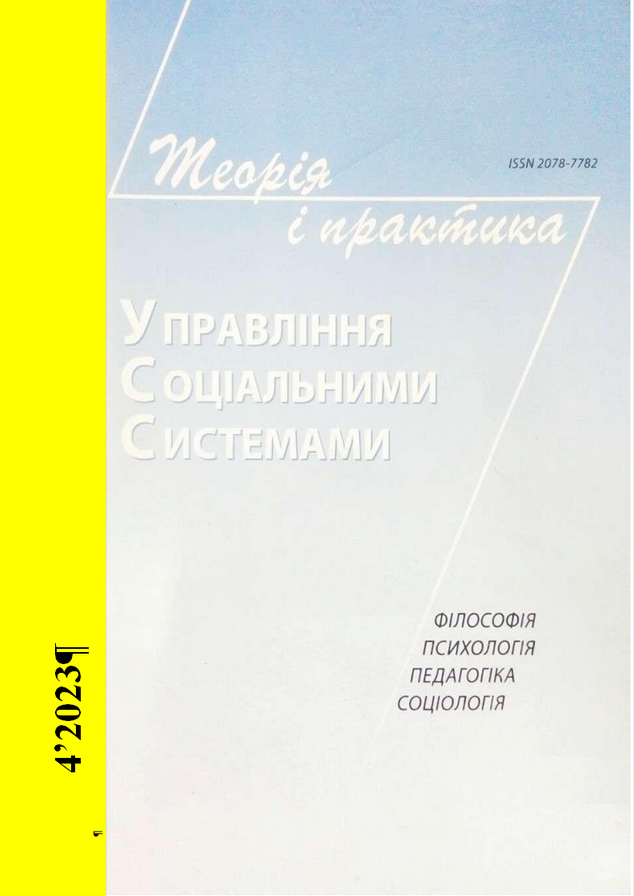ОСОБЛИВОСТІ РОЗВИТКУ СТРЕСОСТІЙКОСТІ МАЙБУТНІХ ПСИХОЛОГІВ МЕТОДАМИ ГЕШТАЛЬТ-ТЕРАПІЇ
DOI:
https://doi.org/10.20998/2078-7782.2023.4.05Ключові слова:
стрес, стресор, вплив, стресостікість, складові стресостійкості, розвиток, майбутні психологи, метод, гештальт-терапіяАнотація
Анотація: у статті проаналізовано наукову літературу присвячену темі стресостійкості. Схематично представлено процес впливу факторів стресу на людину. Нагляно проілюстровано місце реакцій організму на вплив стресорів у процесі розвитку стресостійкості. Дано власне визначення поняттю стресостійкість. Виділено основні складові стресостійкості. Обґрунтовано необхідність розвитку стресостійкості майбутніх психологів. Висвітлено значущість використання методів гештальт-терапії у процесі розвитку стресостійкості майбутніх психологів.
Посилання
Cannon, W. (1929), “Bodily changes in pain, hunger, fear and rage”, 2nd ed. New York, London: D. Appleton and Company, p. 404
Masquelier, G. (2015), “Gestalt therapy: Living creatively today”, 1st ed. Gestalt Press p. 176 p.
Perls, F., Hefferline, R., Goodman, P. (1951), “Gestalt Therapy: Excitement and growth in the human personality”, New York, p. 514
Selye, H. (1974), “Stress Without Distress”, 1st ed., Philadelphia: Lippincott Williams & Wilkins, p. 171
Selye, H. (1950), “The physiology and pathology of exposure to stress”, A treatise based on the concepts of the general-adaptation-syndrome and the diseases of adaptation: doctoral dissertation, Montreal; ACTA
Boyko, G., Kozlova, T., Sharafutdinova, S. (2022), “Achieving the effect of compliance with the norms of physical activity and the formation of stress resistance in higher education students in the context of the Russian-Ukrainian war”, Physical Education in the Context of Modern Education: Abstracts of the XVII International Scientific and Methodological Conference, Kyiv, pp. 17 – 19
Burban, N., Guzenko, I. (2019), “Features of stress resistance and adaptive abilities to stress of future military personnel”, Pedagogy and psychology of vocational education, no. 1, pp. 105 – 116
Gurleva, T., Zhuravleva, N. (2022), “Self-confidence as an important attribute of personality stress resistance in the context of information warfare: the relationship of concepts”, Scientific Notes of TNU. Series "Psychology", 2022, vol. 33, no. 72, pp. 76 – 82
Kovalchuk, Z., Vasyanovych, G. (2022), “Prominent figures of psychology: history, present and prospects”, Proceedings of the VIII regional scientific seminar, Lviv, 2022, p. 192
Kogut, O. (2021), “Psychology of personality stress resistance”, Monograph. Kryvyi Rih: State Institute of the Ministry of Internal Affairs of Ukraine, p. 435
Kushnir, V. (2022), “Stress in cats: diagnosis and complex therapy”, Agrarian Bulletin of the Black Sea Region, is. 104 – 105, pp. 65 – 69
Levenets, T., Smirnov, O., Taran, N., Mykhalska, L., Schwartau, V. (2022), “Cadmium stress in plants: toxicity and mechanisms of resistance”, Plant physiology and genetics, vol. 54, no.4, pp. 279 310
Mikhailova, O. (2022), “Stress. Formation of personality stress resistance”, Correctional and development programme, Nizhyn: Nizhyn State University named after M. Gogol, p. 55
Moroz, L., Safin, O. (2022), “A model for the development of stress resistance of higher education students under martial law”, Scientific Notes of Vernadsky National University, pp. С. 48 – 53
Podbutska, N., Martynenko, E. (2023), “Protective factors of the resistance process”, Theory and practice of social systems management, no.3, pp. 62 – 75
Sellier, G. (1998), “A syndrome caused by various harmful agents”, Journal of Neuropsychiatry and Clinical Neuroscience, vol. 10, no. 2, pp. 230 – 231
Sellier, G. (2016), “Stress without distress”, Mankovsky Journal of Neurology, – vol. 4, no. 1, pp. 78 – 89
Chernova, V. (2023), “Stress Resilience of Future Psychologists as a Factor of Successful Learning and Professional Self-Actualisation”, Editorial board,. pp. 261 – 263
Spak, M. (2022), “Personality stress resistance in the discourse of modern psychological research”, Habitus: a scientific journal. Helvetica, – 2022, is. 39, pp. 199 – 203
##submission.downloads##
Опубліковано
Номер
Розділ
Ліцензія
Авторське право (c) 2023 Ольга Овчиннікова, Ніна Підбуцька

Ця робота ліцензується відповідно до Creative Commons Attribution-NonCommercial-NoDerivatives 4.0 International License.
Автори, які публікуються у цьому журналі, погоджуються з наступними умовами:- Автори залишають за собою право на авторство своєї роботи та передають журналу право першої публікації цієї роботи на умовах ліцензії Creative Commons Attribution License, котра дозволяє іншим особам вільно розповсюджувати опубліковану роботу з обов'язковим посиланням на авторів оригінальної роботи та першу публікацію роботи у цьому журналі.Автори, які публікуються у цьому журналі, погоджуються з наступними умовами:

